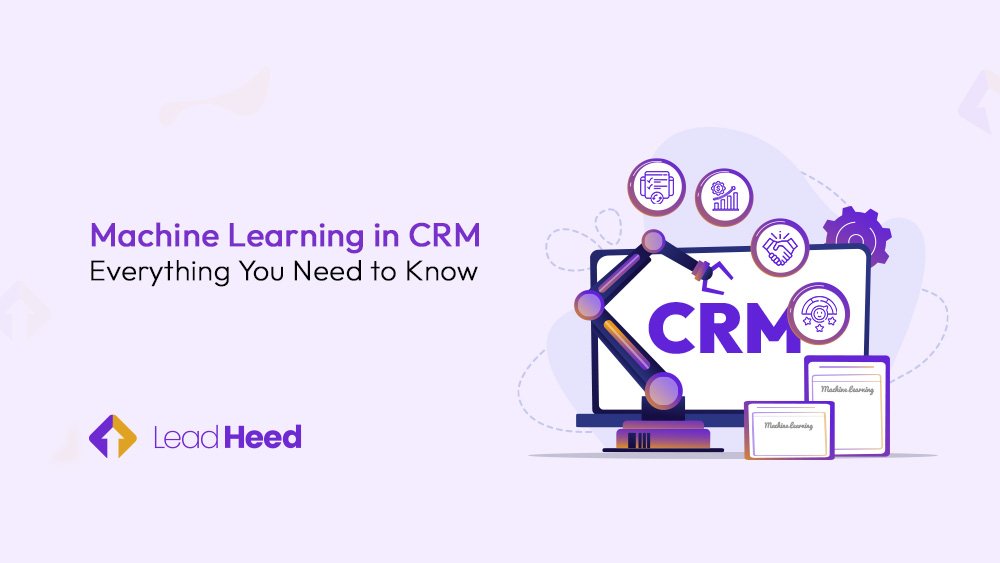Customers expect services that are personalized for them. But many businesses still rely on traditional CRMs that don’t offer real insights. The result? Missed sales, generic campaigns, and frustrated customers who move on quickly.
That’s where machine learning changes the game. Machine learning in CRM analyzes vast amounts of customer data to spot patterns in how people act, determine their needs, and create effective marketing campaigns based on those insights. And in return, you build stronger relationships, close more deals, and make faster, wiser decisions.
Let’s see how this powerful combination can boost your business.
What is Machine Learning in CRM?
Machine learning in CRM (Customer Relationship Management) is the use of algorithms to analyze customer data, predict behaviors, and automate personalized interactions, improving customer engagement and business outcomes.
Unlike traditional customer relationship management systems that rely on fixed rules to manage customer data, interactions, and sales, ML-powered CRMs are dynamic and intelligent.
Instead of just holding data, the system learns from it, allowing your company to take proactive instead of reactive measures.
How Does Machine Learning Enhance CRM Systems?
Machine learning transforms CRM from a simple data tool into a smart, responsive system. It helps businesses personalize customer experiences, predict behavior, group customers more effectively, and automate everyday tasks.
1. Personalization
One of the most powerful ways machine learning improves CRM systems is by enabling deep, meaningful personalization. Since customers prefer businesses that understand their needs and preferences, machine learning helps businesses understand each customer on a deeper level.
It identifies patterns and categorizes customers based on these patterns. This assists in suggesting the right products and sending personalized messages to the right customer.
2. Predictive Analytics
By analyzing customers’ past behavior and purchase history, machine learning can predict what the customers will want and purchase next. This also forecasts when customers will make a purchase and who is most likely to stop buying (churn).
Further, it assists businesses in making better data-driven decisions and implementing sales and marketing strategies more effectively. It allows companies to respond early, customize offers, retain customers, and yield better results.
3. Customer Segmentation
Machine learning takes customer segmentation to the next level by uncovering patterns in data that humans might overlook. It analyzes behavior, preferences, and purchase history to group customers more accurately.
Businesses can create highly targeted campaigns, deliver personalized offers, and focus on high-value segments with precision. This leads to smarter marketing, better engagement, and increased revenue with less guesswork.
4. Automation
Machine learning enhances CRM systems to become smart by automating time-consuming routine tasks. Data entry, lead scoring, lead assignment, or follow-up emails are some of the tasks that can be automated.
For example, ML can review a lead’s behavior and automatically assign it to the right salesperson, by industry, interest, or the way they interacted with your brand. It can even automate sending tailored emails or promotions.
This degree of automation reduces errors, saves time, and enables your teams to focus on more important activities like customer relationship building and transaction closing. It enhances the efficiency of your marketing and sales process while making it more focused and effective.
Benefits of Machine Learning in CRM
Machine learning for CRM improves customer experiences, increases sales, creates more effective marketing campaigns, saves time and costs through automation, and helps make smarter, data-backed decisions.
Let’s explore the key advantages:
1. Improved Customer Experience and Satisfaction
One of the most important benefits of ML in CRM is improved customer experience and satisfaction. ML-powered chatbots can respond to frequent questions immediately, such as queries on orders or password resets. This means customers don’t have to wait for assistance.
For challenging issues, ML sends each query to the appropriate support representative, resulting in faster resolution. This makes customers feel heard and respected, leading to increased satisfaction and confidence.
2. Increased Sales and Conversion Rates
ML generates more conversions and sales as it enables companies to focus on what works. It also identifies the leads with the greatest chance of buying, thus enabling sales teams to focus and make sales faster. By providing relevant offers and product suggestions based on customer data, you can boost engagement, response rates, and sales success.
3. More Effective Marketing Campaigns
Machine learning makes marketing campaigns smarter and more results-driven. Instead of sending everyone the same message, ML tailors emails, ads, and promotions to match each user’s search queries.
It also tracks how people interact with campaigns, so marketers can easily tell what’s working and adjust in real-time. The results are higher engagement, enhanced lead nurturing, and better-performing campaigns that deliver more returns.
4. Time and Cost Savings Through Automation
ML in CRM automates repetitive tasks like data entry, lead scoring, follow-up emails, and social media posting. This helps businesses save time and cut costs. Instead of spending hours on manual work, teams can rely on ML to handle routine processes with speed and accuracy.
This not only reduces human error but also allows employees to focus on higher-value tasks like closing deals or improving customer relationships. As a result, businesses operate more efficiently, reduce operational costs, and achieve more in less time.
5. Data-driven Decision-making for Better Business Outcomes
Machine learning analyzes customer data at scale and identifies trends in customer behavior. This helps you predict future actions and provides actionable insights, helping businesses make choices based on facts, not guesswork. This empowers CRM systems to make faster and more informed decisions.
From setting accurate sales forecasts to refining marketing strategies, ML turns data into a powerful decision-making tool. This leads to better planning, more efficient resource use, and strategies that align closely with customer needs.
How to Implement Machine Learning in Your CRM System?
Implementing CRM with ML starts with clear goals and clean data. You’ll need the right tools, a trained model, smooth integration with your current system, and team buy-in. Here are the steps that help businesses apply machine learning in ways that deliver real results.
1. Set Clear Business Objectives
Before diving into machine learning, ask yourself: What am I solving? Maybe you’re looking to forecast customer churn, personalize outreach, or automate lead scoring. Having clear objectives ensures that you’re not wasting time on features that are useless for your business.
2. Gather and Clean Quality Data
Machine learning works with data; the more specific and organized it is, the better your results will be. That means getting data from various sources (customer support, marketing, sales), cleaning it up, and presenting it consistently.
On the other hand, dirty data leads to dirty results, so do it right.
3. Choose the Best Tools and Technology
Not all tools are created equal. Choose a CRM platform or third-party AI software suitable for your business size, team’s ability, and budget. Then, look for platforms with easy integrations, flexible AI abilities, and good customer care. Hire necessary tech partners or consultants to help you find the most appropriate solution.
4. Train the Machine Learning Models
It’s now time to teach your CRM what to do. Using historical customer data, you’ll train your machine learning models to recognize patterns, like what kind of leads are most likely to convert or when a customer is likely to churn. Start small, test results, and gradually expand as the model gets smarter.
5. Monitor and Improve
No machine learning model is perfect from day one. After your system is live, monitor how it’s performing. Are the forecasts correct? Are the automations truly saving time? Be ready to tune your models, retrain on fresh data, and adjust your parameters regularly.
6. Seamlessly Integrate with Your Current CRM Landscape
ML needs to integrate smoothly into your existing CRM system. Examine your current setup and identify areas where ML can add value, such as email automation, customer service, or marketing. Then, strive to integrate your ML solutions seamlessly into your daily processes.
7. Get Your Team on Board
Even the best system will not work if your team does not utilize it. You should offer necessary training classes, thoroughly documented materials, and support maintenance. Show your employees how machine learning can make their jobs easier, not replace them. When they understand the value, they’ll be much more likely to welcome it.
Challenges of Implementing Machine Learning in CRM
While the rewards are high, there are also some challenges to using machine learning and CRM together. Poor data quality, high setup costs, complex integration, and a lack of skilled staff can slow progress. But with proper planning and investment, these obstacles can be managed for long-term success.
Understanding these challenges helps you stay ahead of them later.
1. Data Management and Quality
Machine learning algorithms are only as good as the data they are trained on. Low-quality customer data, be it inaccurate, incomplete, or outdated, can lead to poor predictions and faulty decisions.
Many CRM systems collect a huge amount of data, but it becomes a liability if that data is not cleaned and organized. You need strong data governance to ensure ML systems use reliable, useful data.
2. Implementation Cost and Complexity
Implementing machine learning in CRM needs new infrastructure and ongoing maintenance. For small and medium enterprises, this can become costly. Integrating ML into old or outdated CRM systems can be challenging. Without a clear plan, it’s a time-consuming and resource-heavy task.
3. Requirement of Skilled Staff
You will need data scientists, ML engineers, and technology-savvy analysts who also understand business goals to implement ML successfully. Unfortunately, there’s a gap in skills here. Companies either must hire qualified professionals, which may be costly, or spend time and effort training existing teams.
Future of Machine Learning in CRM
The future of CRM is being influenced by the growing strength of machine learning. As machines become more intelligent, CRM software will also become more intelligent, intuitive, and responsive. Businesses will not only react to customer needs but also anticipate them.
We already know how ML predicts customer actions and recommends products. And the best is yet to come. Imagine voice-activated assistance through natural language processing, more sophisticated automation for every interaction, and decision-making in real-time with high-powered analytics.
Machine learning will no longer be a tool but a driver of customer loyalty and business growth. Those companies that act early will gain a strong edge in understanding their customers, increasing engagement, and making more informed strategic choices.
To unlock this future, businesses must invest in tools and train employees. Upskilling staff and building a data-driven culture are key. Combining people, data, and smart systems will lead to CRM success in the long run.
Conclusion
Machine learning is changing the way businesses use CRM. It helps personalize customer experiences, predict future behavior, and automate routine tasks, making work faster, smarter, and more accurate. With ML, businesses can create better marketing campaigns, close more deals, and make data-driven decisions that lead to growth.
While there are some challenges like cost and data quality, the benefits—better customer service, higher sales, and improved marketing make it worth the effort. Whether you’re a small startup or an enterprise, combining machine learning and CRM can give you a competitive edge.
FAQs
What is CRM in machine learning?
CRM in machine learning refers to using algorithms to analyze customer data, identify patterns, and automate decisions in customer relationship management. It helps businesses understand customer behavior, predict needs, and improve interactions for better results.
What is the difference between traditional CRM and CRM with machine learning?
Traditional CRM stores and organizes customer data manually, while CRM with machine learning learns from that data to make smart predictions and automate tasks. This means more accurate insights, faster responses, and personalized customer experiences.
How does machine learning improve customer segmentation?
Machine learning analyzes customer behavior, preferences, and purchase history to group customers more accurately. It finds hidden patterns that manual methods may miss, helping businesses create more targeted campaigns and better serve each customer group.
What types of businesses benefit most from machine learning in CRM?
Businesses with large customer bases or data-driven processes like e-commerce, finance, telecom, and SaaS benefit most. However, any business looking to improve customer experience, boost sales, and streamline operations can gain from ML in CRM.
Can small businesses afford to implement machine learning in their CRM systems?
Yes! Many modern CRM tools offer built-in AI features that are cost-effective and easy to use, even for small teams.



